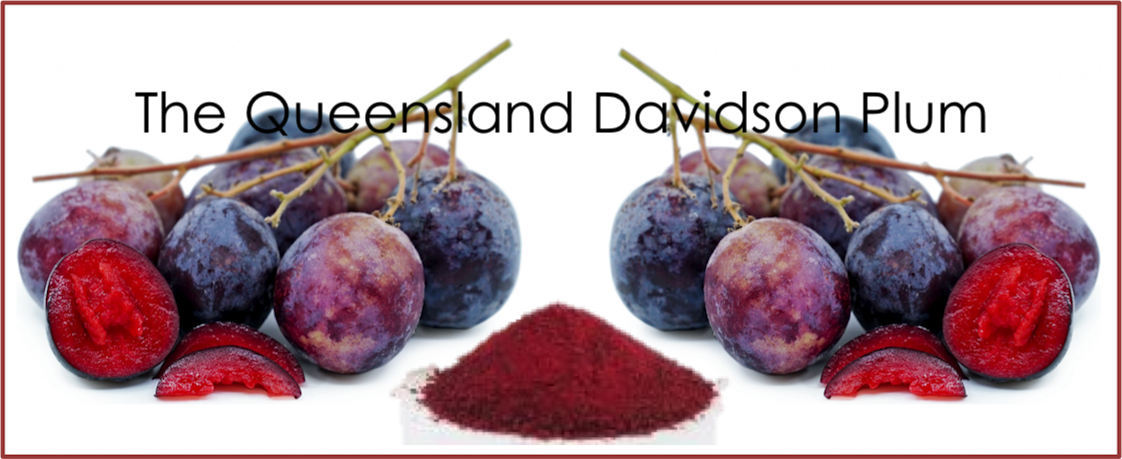Todays’ post is about the Queensland Davidson Plum. We have just spent a week holidaying in Cairns and this fruit makes a regular appearance on restaurant menus.
I didn’t know a lot about this native fruit, which is considered highly nutritious. I have done some research and here is what I found.
The Davidson plum is an Australian Native food with it’s earliest known mention by ‘The Gardeners Chronicle’ in 1876.
There are several species of Davidson Plum, naturally growing from far-northern New South Wales to tropical north Queensland.
The species found mainly in N.S.W is Davidsonia jerseyana and is classified as endangered. The Davidson plum commonly found in Queensland, Davidsonia pruriens, is not.
More about the Qld variety
This species of rainforest tree naturally grows in the coastal and upland rainforests of northeast Queensland. The species is also grown commercially in mid-north coastal areas of New South Wales and on the Atherton Tableland in north Queensland. The Queensland Davidson’s plum, is a taller tree than the other species, reaching up to 12 metres high.
Its fruit is larger, firmer and generally grows on the upper branches of the fruit tree, rather than along the trunk. The fruit superficially resembles the European plum and contains 2 flat fibrous seeds.
Davidson plums are not often eaten as fresh fruit due to the intense fruit acid and low sugar content. This gives them a sour taste with a slight bitterness.
All the health benefits
The flavour of the fresh fruit may not be popular, however the fruit has other properties that have contributed to its demand.
The deep, dark purple fruit with blood red flesh contains high levels of anthocyanins, natural pigments that are strong antioxidants. An antioxidant powerhouse, the plum has levels higher than the blueberry, which is renowned worldwide as the ‘health-promoting fruit’.
Antioxidants hold a number of benefits for human health, potentially preventing and delaying diseases such as Alzheimer’s disease, autoimmune and cardiovascular disease, cancer, and diabetes.
The substantial amount of antioxidants means you only need to consume small amounts and still receive the equivalent nutritional benefits compared to other fruit and vegetables.
The Davidson plum also contains very high levels of potassium. Potassium helps our muscles move, our nerves work and our kidneys filter out toxins. It also plays a vital role in our metabolism.
A good source of Vitamin C, almost 100 times the amount found in oranges.
They are also a unique dairy-free source of calcium and contain significantly more lutein than an avocado (thought to be the primary source of lutein). Lutein is a carotenoid vitamin that plays an important role in eye health.
The skin of the Davidson plum contains the majority of the nutrients, so it is recommended to consume the fruit in full for all the benefits.
Food uses
Davidson plums are usually combined with other ingredients to balance out their intense, tart flavour. The intense burgundy colour of the plum can act as a natural food colorant giving it many uses in food manufacturing industries.
As a fresh fruit they are used in a range of sweet and savoury preparations. Davidson plums can be cooked down to make sauces, preserves, chutneys, and pie fillings. They can be macerated or pressed to make marinades, glazes, and dressings. Additionally, they are used to make juice, wine, liqueurs, and cordials.
For convenience, many health food companies are freeze-drying or air drying the fruit and creating powders that can be added to numerous recipes and dishes. These bright powders have been used on cooking shows like Masterchef.
Studies are also being conducted on the Davidson Plum’s antimicrobial properties, which are thought to act as a natural food preservative.
However you try this amazing fruit, it definitely has some great benefits for our health.
Till the next post,
Live Clean n Prosper
Sources – Wikipedia , Australian Native Food and Botanicals, Specialty Produce, Sustainable Gardening Australia

